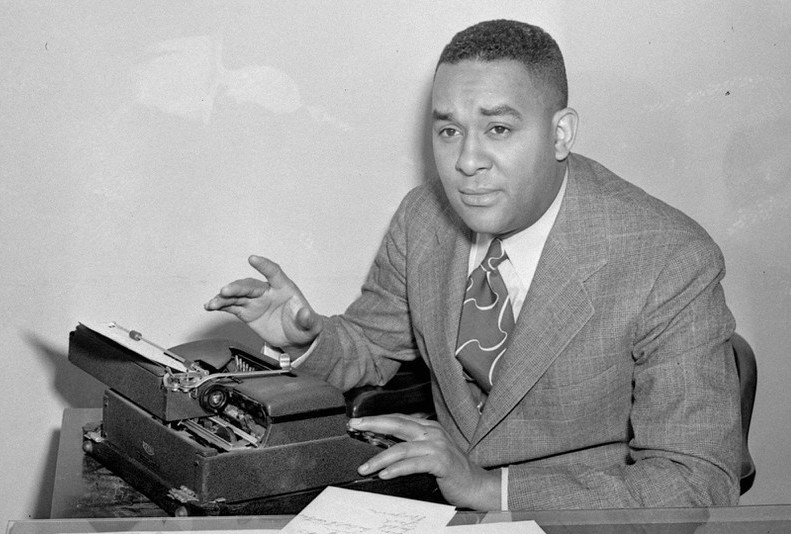Richard Wright, the first African-American man to make a living as an author, is known for landmark books like “Native Son” and “Black Boy.”
Richard Wright’s Early Days
Richard Wright was born near Natchez, Miss., on Sept. 4, 1908, to Nathaniel Wright, a sharecropper, and Ella Wilson Wright, a schoolteacher who later took up farm work. Wright and his family moved around a great deal in his youth. They went to Memphis, Tenn., in 1913, where Nathaniel worked as a hotel porter; he eventually left Ella for another woman.
After stints with his maternal grandparents and in an orphanage when his mother fell ill, Richard moved with her and his brother Leon to Elaine, Ark., the home of her sister and brother-in-law, Maggie and Silas Hopkins; Silas was murdered by whites within the year, prompting another move, to West Helena, Ark.
As Wright describes in the first volume of his autobiography, “Black Boy,” his education was spotty during his adolescence, but he eventually found comfort at the Jim Hill School in Jackson, Miss.
While working summer jobs, Wright observed undereducated and illiterate fellow African-Americans, but had himself “developed his fascination with the power of words at an early age,” writes ITVS. He maintained his love of reading as a young man, admiring and taking cues from writers like H.L. Mencken. Fellow high school students remember that Wright “always had his head in a book.”
Wright’s Novels
Frustrated with life in the South, Wright moved to Chicago in 1927, having already published his first short story, “The Voodoo of Hell’s Half-Acre,” in the Southern Register. He worked at a post office and as a street sweeper, and also continued to write and publish short stories in the 1930s, including a collection called “Uncle Tom’s Children.”
During this period, Wright also began writing for communist publications, joining a Chicago intellectual branch of the Communist Party called the John Reed Club. After he moved to New York in 1937, he helped found the publication New Challenge and helped edit the Daily Worker and Left Front. He eventually split from the Communist Party over philosophical disagreements, chronicling his experiences at length in the second volume of his autobiography, “American Hunger.”
Wright was awarded a Guggenheim Fellowship the following year, allowing him to work on his most famous work, “Native Son,” which was published in 1940. The novel forced readers to confront the status of blacks, particularly in the South.
“Injustice which lasts for three long centuries and which exists among millions of people over thousands of square miles of territory, is injustice no longer; it is an accomplished fact of life,” Wright wrote.
The book was the first best-selling novel by an African-American writer, and earned Wright the NAACP’s Spingarn Medal in 1941.
The Man and His Work
The Rest of the Story
In the racist climate of the times, Wright’s wealth and success didn’t mean much. In 1947, he forsook the United States for the more liberal arena of Paris, home to so many other expatriate writers and African-American artists. In Paris said, he “never felt a moment of sorrow.” He met French existentialists, including Jean-Paul Sartre, who is thought to have greatly influenced Wright’s novel “The Outsider” (1953).
Wright never returned to America. His former membership in the Communist Party attracted the scrutiny of the CIA and FBI and, during the era of McCarthyism in the 1950s, he was blacklisted by the Hollywood’s Directors’ Guild. He spent much of the rest of his life traveling. He visited Africa and wrote important nonfiction about emerging African nations, and lectured on literature and other topics.
After contracting amoebic dysentery during a trip to Africa, Wright died of a heart attack on Feb. 28, 1960. Cremated along with a copy of the first volume of his autobiography, “Black Boy,” his remains were buried in Paris’s famed Père-Lachaise cemetery.
His wife Ellen, a Jewish woman of Polish descent, helped to publish more of his work, including the short story collection “Eight Men” (1961) and a Joycean novel, “Lawd Today” (1963). His final novel, “Island of Hallucinations,” has never been published.
In 1980, his elder daughter Julia Wright published the unfinished novel “A Father’s Law,” about a police chief who believes his son is a murderer.
Today, books like “Black Boy” and “Native Son” are permanent fixtures of high school and college reading lists, along with works of the African-American authors for whom Wright paved a trail, such as Ralph Ellison (“Invisible Man”) and James Baldwin (“Go Tell It on the Mountain”).











